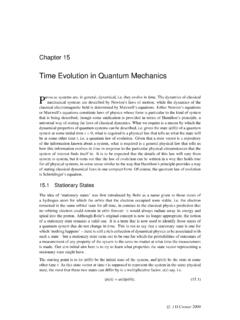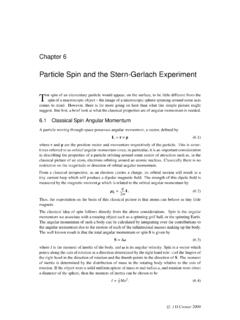Transcription of Quantum Physics Notes - Macquarie University
1 Quantum Physics NotesJ D CresserDepartment of PhysicsMacquarie University31stAugust 2011 PrefaceTheworld of our every-day experiences the world of the not too big (compared to, say, agalaxy), and the not too small, (compared to something the size and mass of an atom), andwhere nothing moves too fast (compared to the speed of light) is the world that is mostly directlyaccessible to our senses. This is the world usually more than adequately described by the theoriesof classical Physics that dominated the nineteenth century: Newton s laws of motion, includinghis law of gravitation, Maxwell s equations for the electromagnetic field, and the three laws ofthermodynamics. These classical theories are characterized by, amongst other things, the notionthat there is a real world out there, one that has an existence independent of ourselves, in which,for instance, objects have a definite position and momentum which we could measure to any degreeof accuracy, limited only by our experimental ingenuity.
2 According to this view, the universe isevolving in a way completely determined by these classical laws, so that if it were possible tomeasure the positions and momenta of all the constituent particles of the universe, and we knew allthe forces that acted between the particles, then we could in principle predict to what ever degreeof accuracy we desire, exactly how the universe (including ourselves) will evolve. Everythingis predetermined there is no such thing as free will, there is no room for chance. Anythingapparently random only appears that way because of our ignorance of all the information that wewould need to have to be able to make precise rather gloomy view of the nature of our world did not survive long into the twentieth was the beginning of that century which saw the formulation of, not so much a new physicaltheory, but a new set of fundamental principles that provides a framework into which all physicaltheories must fit: Quantum mechanics.
3 To a greater or lesser extent all natural phenomena appear tobe governed by the principles of Quantum mechanics, so much so that this theory constitutes whatis undoubtedly the most successful theory of modern Physics . One of the crucial consequencesof Quantum mechanics was the realization that the world view implied by classical Physics , asoutlined above, was no longer tenable. Irreducible randomness was built into the laws of world is inherently probabilistic in that events can happen without a cause, a fact first stumbledon by Einstein, but never fully accepted by him. But more than that, Quantum mechanics admits thepossibility of an interconnectedness or an entanglement between physical systems, even thosepossibly separated by vast distances, that has no analogue in classical Physics , and which playshavoc with our strongly held presumptions that there is an objectively real world out there.
4 Quantum mechanics is often thought of as being the Physics of the very small as seen throughits successes in describing the structure and properties of atoms and molecules the chemicalproperties of matter the structure of atomic nuclei and the properties of elementary particles. Butthis is true only insofar as the fact that peculiarly Quantum effects are most readily observed at theatomic level. In the everyday world that we usually experience, where the classical laws of Newtonand Maxwell seem to be able to explain so much, it quickly becomes apparent that classical theoryis unable to explain many things why a solid is solid , or why a hot object has the colour thatit does. Beyond that, Quantum mechanics is needed to explain radioactivity, how semiconductingdevices the backbone of modern high technology work, the origin of superconductivity, whatmakes a laser do what it does.
5 Even on the very large scale, Quantum effects leave their markc J D Cresser 2011 Forewordiiin unexpected ways: the galaxies spread throughout the universe are believed to be macroscopicmanifestations of microscopic Quantum -induced inhomogeneities present shortly after the birthof the universe, when the universe itself was tinier than an atomic nucleus and almost whollyquantum mechanical. Indeed, the marriage of Quantum mechanics the Physics of the very small with general relativity the Physics of the very large is believed by some to be the crucial stepin formulating a general theory of everything that will hopefully contain all the basic laws ofnature in one impact of Quantum mechanics on our view of the world and the natural laws that govern it,cannot be underestimated.
6 But the subject is not entirely esoteric. Its consequences have beenexploited in many ways that have an immediate impact on the quality of our lives. The economicimpact of Quantum mechanics cannot be ignored: it has been estimated that about 30% of the grossnational product of the United States is based on inventions made possible by Quantum anyone aims to have anything like a broad understanding of the sciences that underpin moderntechnology, as well as obtaining some insight into the modern view of the character of the physicalworld, then some knowledge and understanding of Quantum mechanics is essential. In the broadercommunity, the peculiar things that Quantum mechanics says about the way the world works hasmeant that general interest books on Quantum mechanics and related subjects continue to popularwith laypersons.
7 This is clear evidence that the community at large and not just the scientific andtechnological community are very interested in what Quantum mechanics has to say. Note thateven the term Quantum has entered the vernacular it is the name of a car, a market researchcompany, and a dishwasher amongst other things!! The phrase Quantum jump or Quantum leap is now in common usage, and incorrectly too: a Quantum jump is usually understood to representa substantial change whereas a Quantum jump in its Physics context is usually something that isvery successes of Quantum mechanics have been extraordinary. Following the principles of quan-tum mechanics, it is possible to provide an explanation of everything from the state of the universeimmediately after the big bang, to the structure of DNA, to the colour of your socks.
8 Yet for allof that, and in spite of the fact that the theory is now roughly 100 years old, if Planck s theory ofblack body radiation is taken as being the birth of Quantum mechanics, it as true now as it wasthen that no one truly understands the theory, though in recent times, a greater awareness has de-veloped of what Quantum mechanics is all about: as well as being a physical theory, it is also atheory of information, that is, it is a theory concerning what information we can gain about theworld about us nature places limitations on what we can know about the physical world , butit also gives us greater freedoms concerning what we can do with this Quantum information (ascompared to what we could expect classically), as realized by recent developments in quantumcomputation, Quantum teleportation, Quantum cryptography and so on.
9 For instance, hundreds ofmillions of dollars are being invested world -wide on research into Quantum computing. Amongstother things, if Quantum computing ever becomes realizable, then all security protocols used bybanks, defense, and businesses can be cracked on the time scale on the order of months, or maybea few years, a task that would take a modern classical computer 1010years to achieve! On theother hand, Quantum cryptography , an already functioning technology, offers us perfect presents a means by which it isalwayspossible to know if there is an eavesdropper listeningin on what is supposed to be a secure communication channel. But even if the goal of building aquantum computer is never reached, trying to achieve it has meant an explosion in our understand-ing of the Quantum information aspects of Quantum mechanics, and which may perhaps one dayfinally lead us to a full understanding of Quantum mechanics Language of Quantum MechanicsAs mentioned above, Quantum mechanics provides a framework into which all physical theoriesmust fit.
10 Thus any of the theories of Physics , such as Maxwell s theory of the electromagnetic field,c J D Cresser 2011 Forewordiiior Newton s description of the mechanical properties of matter, or Einstein s general relativistictheory of gravity, or any other conceivable theory, must be constructed in a way that respectsthe edicts of Quantum mechanics. This is clearly a very general task, and as such it is clear thatquantum mechanics must refer to some deeply fundamental, common feature of all these common feature is theinformationthat can be known about the physical state of a physicalsystem. Of course, the theories of classical Physics are built on the information gained about thephysical world , but the difference here is that Quantum mechanics provides a set of rules regardingthe information that can be gained about the state ofanyphysical system and how this informationcan be processed, that are quite distinct from those implicit in classical Physics .










